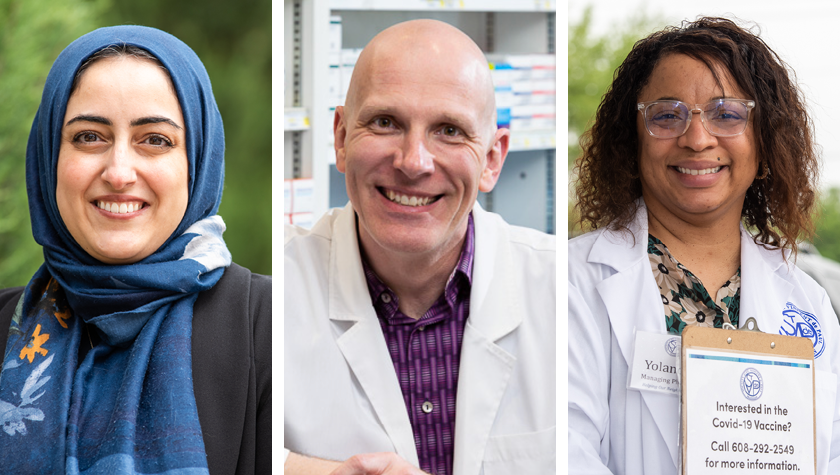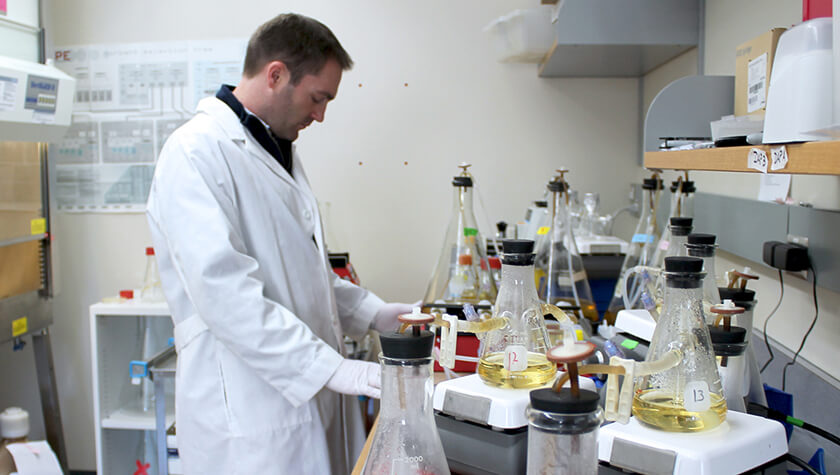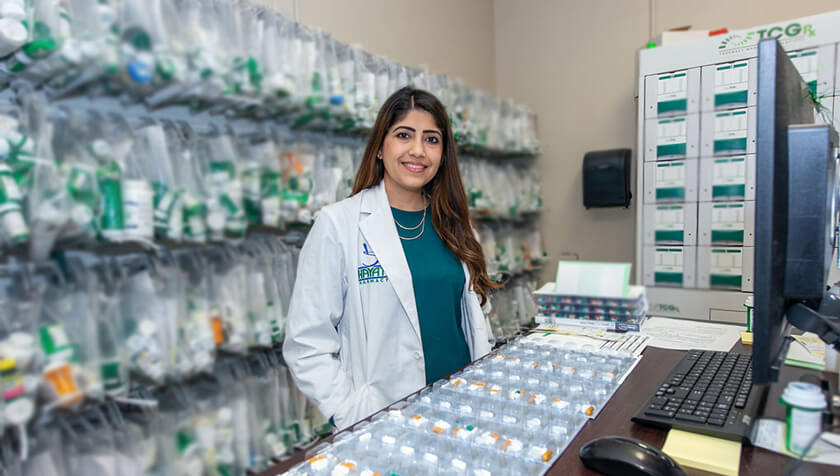
Pharmacy Experts webinars feature faculty, alumni sharing their broad expertise in practice and research
By Katie Ginder-Vogel
In late 2020, as the first COVID-19 vaccines were nearing emergency use authorization, the University of Wisconsin–Madison School of Pharmacy saw an opportunity to give alumni and friends of the School access to the pertinent knowledge of faculty, such as vaccine expert Mary Hayney, professor in the Pharmacy Practice and Translational Research Division, who had been closely following their development.
In October 2020, Hayney hosted a webinar — Vaccines for COVID-19: The Developing Landscape — to break down not only the pandemic itself, with historical context, but also the technologies being used to develop the upcoming vaccines, including the new mRNA formulations. It answered key questions that pharmacy practitioners, as well as patients, were bound to have.
The more than 600 attendees were grateful for the presentation and shared expertise, leading the webinar’s organizers to continue producing more, featuring faculty and alumni speaking on timely topics in healthcare.
“I am quite inspired by the incredible things that our faculty and alumni are doing to impact patient care. It is really amazing to learn what our alumni are doing and the impact that they are having in many areas of practice and research.”
—David Mott
“There is value to alumni in connecting with the School of Pharmacy and connecting with fellow School of Pharmacy alumni who are providing content during the webinars,” says Professor and Associate Dean for Advancement Dave Mott. “I know, personally, I am quite inspired by the incredible things that our faculty and alumni are doing to impact patient care. It is really amazing to learn what our alumni are doing and the impact that they are having in many areas of practice and research.”
The School of Pharmacy’s resulting Pharmacy Experts webinar series — developed in 2020 by Mott and Alissa Karnaky, alumni relations and advancement coordinator — showcases cutting-edge work by alumni and faculty, sharing the skills and knowledge in the Badger pharmacy network that are laying the groundwork for the future of pharmacy.
“We wanted to showcase the expertise of our School of Pharmacy faculty in dealing with everyday pharmacy practice-type issues,” says Mott. “We thought such a series would appeal to our alumni pharmacists and scientists alike and be a good way for us to engage with our alumni. The series has evolved to include our alumni serving as the experts, which has been fantastic.”
Broad, accessible expertise
Since the series launched, the School has hosted a total of five webinars, ranging from a scientific look at antimicrobial resistance to issues of health equity in the community.
Following Hayney’s webinar, Warren Rose, associate professor in the Pharmacy Practice and Translational Research Division and renowned expert in infectious disease, hosted a live presentation about a pressing global health issue: Antibiotic Resistance in Gram-Negative Bacteria: Treatment Challenges and New Options.
Rose discussed the management of three groups of antimicrobial resistant gram-negative bacteria that pose significant therapeutic challenges — extended-spectrum β-lactamase producing Enterobacterales, carbapenem-resistant Enterobacterales, and Pseudomonas aeruginosa with difficult-to-treat resistance — and covered new guideline recommendations from the Infectious Diseases Society of America and the role of newly developed agents in clinical practice.

Although the topic was complex, attendees said the information was clear, concise, and relevant.
“Very informative about the future of antimicrobials and resistance,” said one attendee. “Easy to understand and actually very practical.”
As the Pharmacy Experts series continued to gain steam, Mott and Karnaky invited alumni to share their breadth of expertise. In January 2022, three School of Pharmacy alums joined a panel discussion geared toward reducing health disparities in vulnerable populations. Moderated by Associate Dean for Diversity and Inclusion Lisa Imhoff, two alums shared their insight into how pharmacists can reduce disparities among underserved populations: Yolanda Tolson (BS ’95), managing pharmacist at the St. Vincent de Paul Charitable Pharmacy in Madison, and Dimmy Sokhal (PharmD ’13), chief clinical officer at Hayat Pharmacy in Milwaukee.
Soon after, a group of faculty, alumni, and other leading pharmacists joined a webinar to illuminate pharmacies’ role in another important community health issue: Administration of Naltrexone Injections for Opioid Relapse Prevention. Jay Ford, assistant professor in the Social and Administrative Sciences Division, moderated the panel that featured Wisconsin pharmacists Eric Jachthuber, of Bentley Pharmacy in Montello; John Lemke (PharmD ’15), community pharmacy managing pharmacist at Streu’s Pharmacy Bay Natural in Green Bay; Thad Schumacher, owner of Fitchburg Family Pharmacy in Madison; and Jenni Villeneuve (PharmD ’02), part owner of Murdock Hometown Pharmacy in Oshkosh.
“The fact that our alumni are in these situations, are leading efforts to improve patient care, reduce disparities, and expand access and proper use to new therapies speaks to the quality of our alumni.”
—David Mott
Attendees had the opportunity to learn about pharmacists’ experiences offering naltrexone to curb opioid misuse and the impact that access to care has on patients.
“I was surprised and proud to see Wisconsin pharmacies having such a proactive part in trying to help with opioid addiction recovery,” said one participant. “You don’t hear very much about that side of the problem and solutions.”
The webinar also pointed out some of the barriers to pharmacists getting involved in the service, such as reimbursement.

“Helping the community and patients is highly rewarding and just the right thing to do,” said another attendee. “However, it is disappointing that the pharmacies providing long-acting injections are only getting reimbursed for the medication but not the service.”
Most recently, Mott himself hosted a panel featuring an interdisciplinary team using technology to address patient health. Digital Therapeutics: The New Frontier covered the ways software can complement traditional therapeutics to treat patients. From Advocate Aurora Health, alumna Dalia Saleh (PharmD ‘14), vice president of care transformation, and Steven Driver, medical director of digital therapeutics and associate medical director for health behavior change, discussed how these technologies provide a new way to augment biology and promote patients’ self-monitoring of their chronic health conditions and adherence to medication.
“Mary Hayney, Warren Rose, and Jay Ford all are experts at what they do, and the alumni who have provided content are on the front lines of practice, dealing with really challenging, difficult, and innovative practice and leadership issues,” says Mott. “The fact that our alumni are in these situations, are leading efforts to improve patient care, reduce disparities, and expand access and proper use to new therapies speaks to the quality of our alumni.”
An eye on the future
Looking forward, the Advancement team plans to continue hosting about three webinars a year, featuring new areas of practice and research by faculty and alums.
The next webinar, set for early winter, will look at another up-and-coming therapeutic: psychoactive substances. Paul Hutson, professor in the Pharmacy Practice and Translational Research Division and director of UW–Madison’s Transdisciplinary Center for Research in Psychoactive Substances, will share promising research on psychedelic therapies for conditions like post-traumatic stress disorder, depression, substance use disorder, and more.
“We welcome suggestions from our alumni and friends on topics that they might want to learn more about,” adds Karnaky. “If there are individuals who can offer their expertise, we’d love to tap into new speakers to feature the wealth of knowledge from our alumni.”